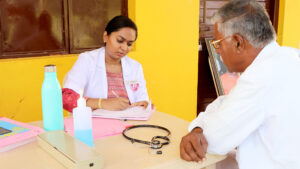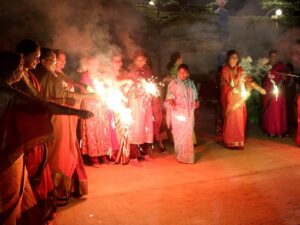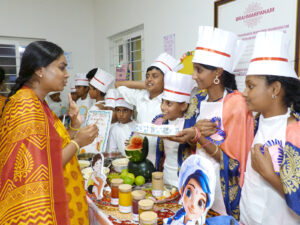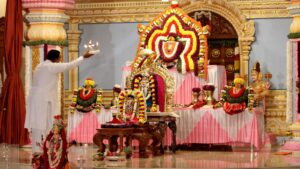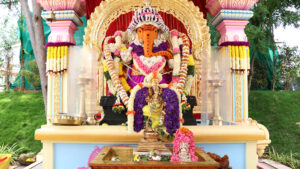The Sri Sathya Sai Kshema Dayini’s healthcare services through its multi-speciality free medical camp was recently extended to the village of Hosadoddi, located about eight kilometres from Sri Sathya Sai Vaatsalyam. The medical camp provided consultations and treatments ranging from basic checkups to addressing specific ailments.
As with every camp, this one too began with prayers and the provision of a nutritious breakfast for all the villagers.

About Hosadoddi village
Hosadoddi Village is located approximately eight kilometres from the Sri Sathya Sai Vaatsalyam ashram. This small rural community has a population of around 150 residents, most of whom earn their livelihood through agriculture and manual labour.
The village’s remote location presents significant transportation challenges. Public transit options such as buses and auto-rickshaws are infrequent, making it difficult for villagers to access essential services. This isolation is particularly problematic given the absence of hospital facilities in the immediate vicinity.
Education is another challenge for Hosadoddi. The village lacks its own school, requiring children to commute daily to nearby educational institutions in Uyyamballi and Yelagahalli.
These geographical and infrastructural constraints underscore the importance of our outreach initiatives like medical camps in improving the quality of life for Hosadoddi’s residents.

The medical camp initiative was met with enthusiastic support from both the village leadership and residents. The head of the panchayat, along with the villagers, extended a warm welcome to the Kshema Dayini team.
Participation in the camp was robust, with a significant number of villagers taking advantage of the services offered. The day began with the distribution of breakfast prasadam to all.

Medical Camp Setup and Community Reception in Hosadoddi
Following breakfast, the medical camp transitioned into its core activities with a structured and efficient process. Villagers began by registering for health screenings, where dedicated volunteers were on hand to record essential vital signs. This initial assessment included measurements of blood pressure, heart rate, height, and weight – critical indicators of overall health status.
After this preliminary screening, participants were systematically directed to doctor consultations. In these one-on-one sessions, each patient received a thorough medical evaluation from qualified healthcare professionals. This comprehensive approach ensured that every individual had the opportunity to discuss their health concerns and receive personalised medical attention.
The organised flow from registration to screening to consultation allowed the camp to serve a large number of villagers effectively.


The medical camp saw robust participation, with nearly half of Hosadoddi’s population in attendance. The demographic was primarily composed of middle-aged and elderly individuals, highlighting the critical need for accessible healthcare among these age groups in rural areas.
The range of medical issues addressed during the camp was diverse, reflecting the varied health challenges faced by the community. Doctors provided consultations and treatments for: hypertension, diabetes, skin allergies, orthopaedic issues, and various internal medicine related ailments.
The camp’s approach went beyond mere diagnosis. Doctors took care to prescribe necessary medications, providing clear instructions on proper dosage to ensure effective treatment. For cases requiring more specialised attention, guidance was given on recommended blood tests, paving the way for more targeted care.
Importantly, the camp’s impact extends beyond the day itself. Plans were established for follow-up consultations with specialists in the coming weeks. These follow-ups are tailored to address the specific medical needs identified during the initial session, ensuring continuity of care and more specialised treatment where necessary.



A Holistic Approach to Rural Development: Combining Healthcare and Skill Development
In addition to providing crucial healthcare services, the medical camp also served as a platform for community outreach and empowerment. Representatives took the opportunity to engage with the village panchayat, sharing information about the Foundation’s Sri Sathya Sai Shubha Dayini initiative.
The Sri Sathya Sai Shubha Dayini initiative, conducted at Sri Sathya Sai Vaatsalyam, offers a series of vocational workshops designed to equip village women with valuable skills. These training sessions cover a range of practical and marketable crafts, including bag making, jewellery making, embroidery, and tailoring.
Shubha Dayini recognises the important role that women play in rural economies and aims to enhance their financial independence and contribution to household incomes.

The village panchayat responded positively, welcoming the initiative as a valuable opportunity for the community. The villagers pledged their support in encouraging local women to participate in these workshops, recognising the potential benefits for individual families and the village economy as a whole.
This exchange highlights the holistic approach taken by the Sri Sathya Sai Premaarpitham Foundation, addressing not only the immediate health needs of the community but also looking towards long-term socio-economic development. By combining healthcare services with opportunities for skill development, the Foundation is working towards comprehensive community upliftment.



